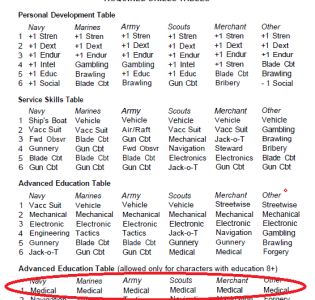It's a bit more mixed up in HG, but broadly, Medical School (which is pretty hard to get into), advancing in the Medical Branch (which has minimum requirements depending on a few things for non-Med school graduates), and Petty Officer Service Skills can all get you the medical skill. There's a couple gotchas, like the Imperial Navy doesn't allow people into the Medical Branch unless they're Int 10+ and EDU 9+ or Social 9+ and want it. But Planetary and Subsector Navies, it only requires Int 10+ or Edu 9+. And Med School is super hard to get into, requiring Honors graduation from college or the Academy, which are hard rolls, to even make the attempt, and then a pretty hard roll to get accepted. That really sounds like the deck is stacked against people wanting to be doctors, and there might not be as many doctors as people would like, creating a need for the self taught/untrained Merchants and Scouts that have figured out how to at least put on a band aid.
Given it's 'advanced education' in all cases, just that two careers allow that without Edu 8+, I don't think they're self-taught. They might not have gone to medical school, and might've done most of the training using learning courses during jump, but I expect that they've done some kind of finishing course and taken exams and are (unless the player and referee decide otherwise) are certified. For an actual doctor or surgeon level of skill I think they really have to have done some formal training, even if it's not at what we'd consider a 'proper' university or teaching hospital. Again, unless player and ref decide otherwise (mad scientist, here we come).
Interestingly, if we look at the 'Doctor' career in
CT's
Citizens of the Imperium (Supp. 4), there's no advantage to enlistment, etc. from Edu. Int gets you enlistment and survival bonuses, and Dex gets you a big enlistment bonus at Dex 9+ (so not just good enough to be a surgeon, but enough to be a notably dexterous surgeon). Doctors gets Merical-1 upon enlistment. Past that they've a 2-in-6 chance per roll on the service skills and both education tables, and can get +1 Soc on the personal development table. The better education table gives them chances of +1 Int or +1 Edu rather than repair skills, while the service skills table might get them +1 Dex (or skill with a melee weapon - it's clearly the 'street doc/'chop shop surgeon' table).
Given doctors have no commissions or promotions, and do not get extra skill rolls past term 1, most full doctors will not be particularly young (average of five terms to get Medical-3). However,
COTI pre-dates the '81 version of the LBB, so I'd allow them (and the other no-position careers in
COTI) two points per term, like Scouts got, making the average number of terms to qualify 'only' three.
For what it's worth, in
MT the Advanced Education tables, due to some of the cascade skills having Medical in them, has a higher chance of getting Medical, and doctors average only needing two terms to qualify.
In both editions Doctor is one of the wealthier careers.
Looking at
TNE, interestingly it's possible to make a doctor who is only marginally competent at medicine (though you have to actively work at it, by making really dumb choices about skills), and a character can enter the medical career with no prior experience or qualifications, and have only Medical 2, and as it's a cascade skill put those points into two specialties (of three) and thus be very barely qualified (normally you'd put them both into one specialty and thus have two levels in that and one effective level in both the other two). So you can have single-term med-techs that shouldn't be allowed near a bottle of asprin, and three-term full doctors (with undergrad and medical degrees, plus a completed internship) that are marginally competent to prescribe that asprin. OTOH, most full doctors will have skill-10 in their specialty, which even with
TNE's inflated skill levels is really rather good. Full doctors get double normal money per term, though as they have to have spent two terms in non-paying education 'careers', they only come out ahead after three terms as a doctor (so 5+ terms all up). Young doctors are poor, old ones are rich (amusingly, old lawyers are probably even richer).

